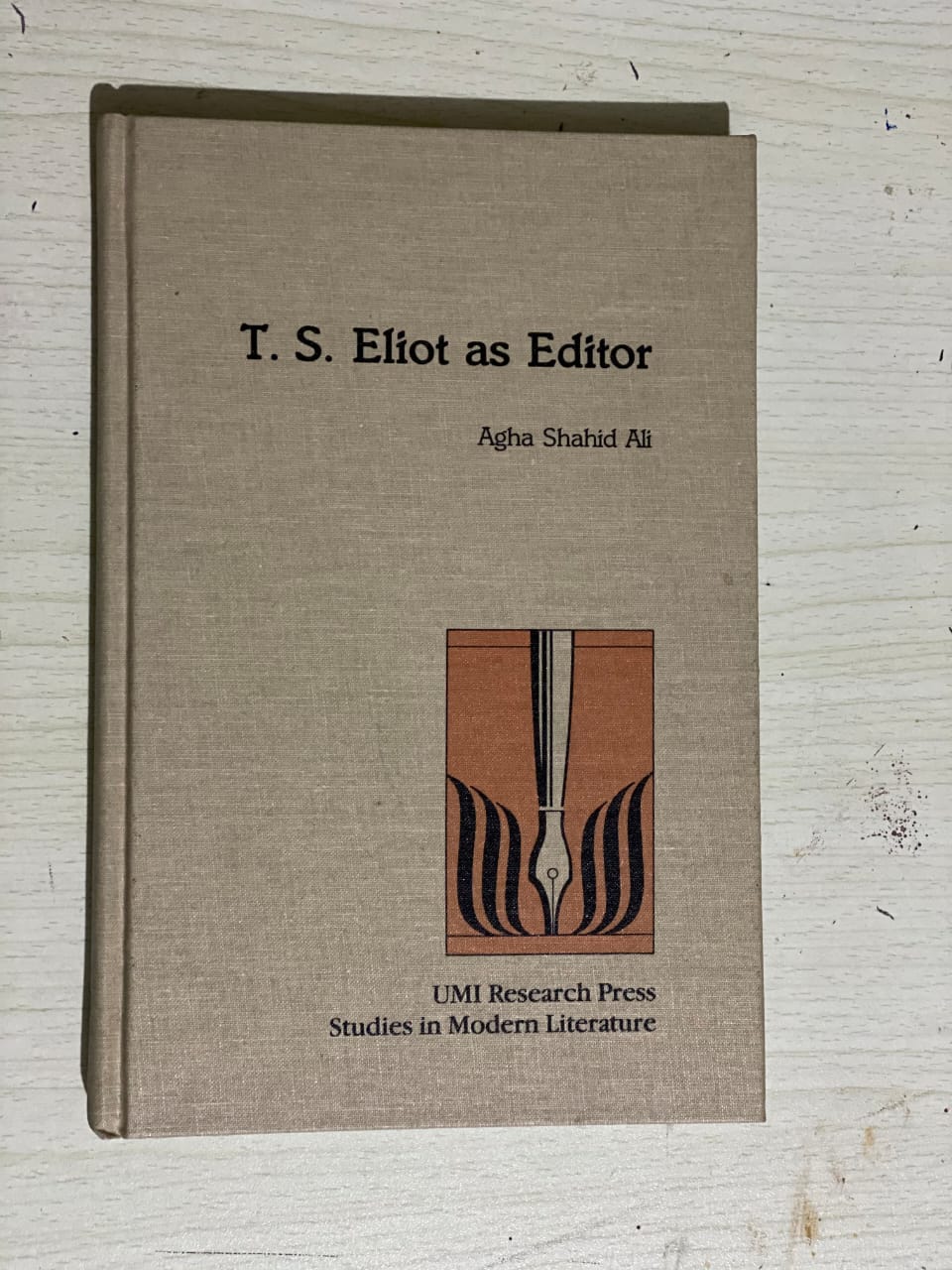The Poet’s Prose: Shahid’s Homeland Lament in TS Eliot Treatise

Muhammad Nadeem is a reader and writes about what he…
As a literary maverick, Agha Shahid Ali is quite legendary for voicing his homeland blues through poetry, but his prose on TS Eliot makes a different case for the poet, perhaps for the first time after his demise, 19 years ago, on December 8, 2001.
Years before he would pen down Rizwan—a poetic Kashmiri boy caught in throes of conflict—Agha Shahid Ali as a young romantic was writing about a revolution in the searing-ly serene seventies.
Despite his father’s favourite crown man returning as a puny leader back home then, this Begum Akhtar diehard was traversing war-torn Europe of yore, where TS Eliot was still finding himself as a mourning child.
Eventually, the World War-bitten Eliot became wellhead for Shahid’s only prose work, the details of which would later find resonance in his celebrated poetry collection.
A streak of sorrow, as they call it, would return to haunt Shahid soon after the arrival of certain Macbeth named “nurse-orderly” on the defiant stage of the valley in the early nineties. The ghoulish governance changed this diligent son of Kashmir’s top educationist forever.
And soon his creative verses would flood the literary void in the valley with lamentations.
Support Our Journalism
You are reading this because you value quality and serious journalism.
But, serious journalism needs serious support. We need readers like you to support us and pay for making quality and independent journalism more vibrant.

“What did the world look like to Thomas Stearns Eliot in 1922, the year in which the first issue of The Criterion came out?” Shahid writes in T.S Eliot As Editor—a biography of a literary journal—The Criterion—that Eliot edited after the war left behind scorched earth in Europe.
“In those post-war years, whatever Eliot prized seemed, if not in danger, at least the direction. History had cunning passages and contrived corridors. The threat – to others the promise – of secularism had hanging over everything since The Origin of Species and Das Kapital, and both The World War One and Russian Revolution had only brought it into much sharper focus. Tradition was in danger, and Eliot yearned for “order”.”
Later the same concern would stem from Shahid’s homeland bleeding poetry.
His first three full-length collections: The Half-Inch Himalayas, A Nostalgist’s Map of America and The Country Without a Post Office are replete with songs of displacement and longing, with the loss of lovers, home, country, memory itself, with laments not only for his past but for the pasts of his parents and grandparents and the ancestors he never knew.
Shahid said that India’s political troubles made him ache for Kashmir, and with the rise of violence in the valley, his attitude towards his homeland changed from memory to mourning.
In 1987, the year that set the stage for the larger defiance driven by rigged polls, Shahid presented the surreal and gothic vision of Ali, and the poems dealing with violence and power in A Walk Through the Yellow Pages.
He captured exile, longing, and desire in his works, before falling to a brain tumour, this day, on December 8, 2001.
Now, almost 19 years after his demise, the poet has for the first time resurfaced as a prose writer in his book on Eliot’s Criterion years.

On completing the first volume of the journal, Shahid writes Eliot must have felt proud.
“A galaxy of stars – Yeats, Pound, Woolf, Valery, Hesse, Pirandello, Forster, and many others – had appeared in such a short period. The Criterion had established itself as a name to be reckoned with, and it was time to define its scope. Perhaps it was safer to define the scope now.”

Unfortunately, the days of The Criterion wouldn’t be the same, despite literary heavyweight Virginia Woolf lamenting over it, in her letter, dated May 22, 1924: “But is there any danger that The Criterion is dying? I hope not.”
The Criterion did almost die. But enough people were interested in the journal’s survival and survive it did.
In that faded journal of literature now, Shahid learned that the philosophies expressed or implicit in various tendencies, such as communism or fascism, “are worthy of dispassionate examination.”
But how Eliot wished to divorce the theory of politics from its practical manifestations, especially about communism, and fascism, is not clear.
However, what is clear is that, Shahid, born in New Delhi in 1949, was highly influenced by English modernists like Eliot.

The Kashmiri-American poet credited Eliot with teaching him the fine art of literary appropriation.
Shahid arrived in the U.S. in 1976 and earned a Ph.D. at Penn State with a dissertation later published as TS Eliot As Editor, his only written nonfiction originally published in 1986.
Later Eliot’s homeland nostalgia would surface in Shahid’s exiled poetry.
While living away from home he banked on the “shards of memory”, which in exile seems to be the only solace.

At the footnotes of his only prose, Shahid saw The Criterion’s failure “as one small instance of the immense failure of Europe” in the years between wars.
“The Criterion will be remembered for its open-mindedness,” Shahid writes. “Eliot’s mind was too large to be confined by its own theoretical formulations.”
Even though being an academic thesis, T.S Eliot as Editor contains some fabrics and textures of Shahid’s poetry. It has a flow that is very rarely found in academic writings.
On the poet’s 19th death anniversary, his prose indeed makes a competing case for him.
It contains a sort of simplicity that makes highly academic work read like a Roald Dahl’s short story while his poems can sometimes make simple facts sound as complex as Derrida’s Deconstruction.
To help us strengthen the tradition of quality reading and writing, we need allies like YOU. Subscribe to us.
Mountain Ink is now on Telegram. Subscribe here.
Become Our Ally
To help us strengthen the tradition of quality reading and writing, we need allies like YOU. Subscribe to us.
Muhammad Nadeem is a reader and writes about what he reads. Among his writings are reviews, poetry, and short stories. He also works with translation and criticism, and has previously been published in Prachya Review, Cafe Dissensus Magazine, Kashmir Lit, Sheeraza, Inverse Journal, AGNI, Poet Lore, 32 Poems, Jaggery Lit among other literary magazines and journals. His poems have been translated and published in several anthologies. His reading interests are diverse, and he has reviewed hundreds of books for literary publications. He is also a former editor of the Mountain Ink.











Beautiful article.What did occur to your mind when writing this piece?Feeling traumatized already and when writing this review,what is it that your mind pictured?
This is so well – written ❤️✊🏻
The perfect bit to read on Shahid’s birthday.